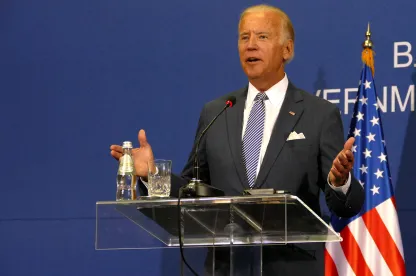Since taking office on January 20th, President Biden has taken the expected actions to halt or slow down many of the policies of the Trump Administration. Some of these actions are global in nature, like rejoining the Paris Climate Accord to address climate change. Others could be felt locally, like the executive order revoking the permit for the Keystone XL Pipeline which will affect Wisconsin companies working on the project. And the new EPA recently requested that the Department of Justice place a hold on all litigation regarding regulations issued under the Trump Administration. These first actions hint that federal agencies like EPA and the Army Corps of Engineers are likely to be substantially more active and may look closer at proposed projects in Wisconsin in the coming years.
Perhaps the initial hallmark of the Biden Administration environmental agenda is the Executive Order on Protecting Public Health and the Environment and Restoring Science to Tackle the Climate Crisis. Under this Executive Order, EPA and other agencies have been tasked with conducting an immediate review of all regulations, orders, guidance and policies enacted during the previous administration. The agencies will be looking to assess whether what was done support various policy goals like: listen to science; improve public health and protect our environment; ensure access to clean air and water; limit exposure to dangerous chemicals; hold polluters accountable, including those who disproportionately harm communities of color and low income communities; reduce greenhouse gas emissions; and prioritize environmental justice and the creation of well-paying union jobs.
In keeping with this Executive Order, the Biden Administration has created a specific list of rules enacted over the last four years that are targeted for reassessment, many of which could lead to changes in how permitted projects are handled going forward. For example, in July 2020, the Council on Environmental Quality made revisions to procedures under the National Environmental Policy Act (NEPA) that essentially removed the requirement to consider cumulative impacts from the “effects” that must be considered as part of an assessment of a project’s possible environmental impacts. Returning to a fuller assessment of cumulative impacts would mean that proposed projects would have to consider not only the impacts directly associated with the project, but also how those actions might compound impacts already occurring from other, unrelated actions.
The Administration will also be reviewing the April 2020 revisions EPA and the Army Corp of Engineers made to the definition of “Waters of the United States” under the Clean Water Act. Essentially, the previous administration narrowed the definition that had been put in place by the Obama Administration in an attempt to limit the jurisdiction of the federal agencies. We can certainly expect that under the Biden Administration, the agencies will exercise a broader scope of authority so that not only will state approvals be needed, but federal approvals as well.
Another area targeted for action is the conduct of risk evaluations under the Toxic Substances Control Act (TSCA). Under TSCA, EPA is supposed to conduct risk evaluations to determine whether a chemical presents an unreasonable risk of injury to public health or the environment. In 2017, the previous administration took steps to narrow the scope of these evaluations. While the risk evaluation process is, by nature, deliberate and subject to extensive review and comment, it is reasonable to expect that more thorough evaluations will be initiated and that those evaluations will include consideration of adverse impacts to low income and other susceptible populations.
While these are just a few of the highlights of the Biden environmental agenda, we can all expect that the Biden Administration will continue to move quickly to reverse the prior administration’s policies, which had been criticized for being too focused on lessening regulations for industry without regard to the long term impacts on public health or the environment. In its place, we can expect to see policies that are intended to push a more pro-consumer, pro-worker agenda—with a particular emphasis on environmental justice.





 />i
/>i

